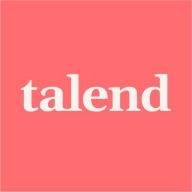

Talend Open Studio and AWS Glue compete in the data integration category. AWS Glue has the upper hand due to its scalability and integration with AWS services.
Features: Talend Open Studio offers an open-source model, component drag-and-drop functionality, and a wide array of connectors for diverse databases. It supports detailed data handling tasks and transparency in data pipelines. AWS Glue provides robust integration with AWS services, a powerful data catalog, and efficient crawlers for real-time processing, making it ideal for those heavily invested in AWS infrastructure.
Room for Improvement: Talend Open Studio could improve its user interface, reduce resource consumption, and enhance documentation for new users. AWS Glue needs to refine integration with non-AWS systems, enhance performance with large datasets, and improve user-friendliness.
Ease of Deployment and Customer Service: Talend Open Studio supports on-premises, cloud, and hybrid deployments but relies on community support, leading to inconsistent customer service. AWS Glue, primarily cloud-based, offers seamless AWS integration but may be complex for non-technical users. AWS provides comprehensive technical support, but documentation improvements could ease the learning curve.
Pricing and ROI: Talend Open Studio is cost-effective for small to medium enterprises with a free version; however, paid versions can become expensive for larger deployments. AWS Glue's pay-as-you-go model suits dynamic scaling but can be costly with extensive data processing. Both tools promise reductions in development time and operational costs, offering positive ROI, though AWS Glue may incur higher initial expenses, offset by its expansive functionality and integration within the AWS ecosystem.
I advocate using Glue in such cases.
AWS's documentation is reliable, and careful reference often resolves missed upgrade details.
For complex Glue-related problems such as job failures or permission issues, their documentation is good, but having direct access to support helps cut down troubleshooting time significantly.
It is beneficial to upgrade jobs, and we conduct extensive testing in development before migrating to production.
It can easily handle data from one terabyte to 100 terabytes or more, scaling nicely with larger datasets.
As a managed service, it reduces management burdens.
A more user-friendly and simpler process would help speed up the deployment process.
Learning the latest functionalities is crucial, and while challenging, it is a vital part of staying current and ensuring an efficient ETL process.
With AWS, I gather data from multiple sources, clean it up, normalize it, de-duplicate it, and make it presentable.
If we could have round-the-clock support, we would be able to resolve many issues which we encounter during the development part.
AWS charges based on runtime, which can be quite pricey.
Costing depends on resource usage, and cost optimization may involve redesigning jobs for flexibility.
The smallest cost for a project is around €700, while the largest can reach up to €7,000 based on the scale of the usage.
AWS Glue has reduced efforts by 60%, which is the main benefit.
AWS Glue also enhances job scheduling and orchestration capabilities, integrating with AWS Glue Studio for comprehensive data workflow management.
For ETL, I feel the performance is excellent. If I create jobs in a standard way, the performance is great, and maintenance is also seamless.
It also comes with a console which helps us to monitor the jobs we have built in, making that monitoring part easy.
| Product | Market Share (%) |
|---|---|
| AWS Glue | 14.4% |
| Talend Open Studio | 3.0% |
| Other | 82.6% |


| Company Size | Count |
|---|---|
| Small Business | 11 |
| Midsize Enterprise | 6 |
| Large Enterprise | 32 |
| Company Size | Count |
|---|---|
| Small Business | 22 |
| Midsize Enterprise | 13 |
| Large Enterprise | 18 |
AWS Glue is a serverless cloud data integration tool that facilitates the discovery, preparation, movement, and integration of data from multiple sources for machine learning (ML), analytics, and application development. The solution includes additional productivity and data ops tooling for running jobs, implementing business workflows, and authoring.
AWS Glue allows users to connect to more than 70 diverse data sources and manage data in a centralized data catalog. The solution facilitates visual creation, running, and monitoring of extract, transform, and load (ETL) pipelines to load data into users' data lakes. This Amazon product seamlessly integrates with other native applications of the brand and allows users to search and query cataloged data using Amazon EMR, Amazon Athena, and Amazon Redshift Spectrum.
The solution also utilizes application programming interface (API) operations to transform users' data, create runtime logs, store job logic, and create notifications for monitoring job runs. The console of AWS Glue connects all of these services into a managed application, facilitating the monitoring and operational processes. The solution also performs provisioning and management of the resources required to run users' workloads in order to minimize manual work time for organizations.
AWS Glue Features
AWS Glue groups its features into four categories - discover, prepare, integrate, and transform. Within those groups are the following features:
AWS Glue Benefits
AWS Glue offers a wide range of benefits for its users. These benefits include:
Reviews from Real Users
Mustapha A., a cloud data engineer at Jems Groupe, likes AWS Glue because it is a product that is great for serverless data transformations.
Liana I., CEO at Quark Technologies SRL, describes AWS Glue as a highly scalable, reliable, and beneficial pay-as-you-go pricing model.
Talend Open Studio is a free, open source ETL tool for data integration and Big Data. The solution enables you to extract diverse datasets and normalize and transform them into a consistent format which can be loaded into a number of third-party databases and applications.
Talend Open Studio Features
Talend Open Studio has many valuable key features. Some of the most useful ones include:
Talend Open Studio Benefits
There are several benefits to implementing Talend Open Studio. Some of the biggest advantages the solution offers include:
Reviews from Real Users
Below are some reviews and helpful feedback written by PeerSpot users currently using the Talend Open Studio solution.
Elio B., Data Integration Specialist/CTO at Asset messages, says, "The solution has a good balance between automated items and the ability for a developer to integrate and extend what he needs. Other competing tools do not offer the same grade of flexibility when you need to go beyond what is provided by the tool. Talend, on the other hand, allows you to expand very easily."
A Practice Head, Analytics at a tech services company mentions, “The data integration aspect of the solution is excellent. The product's data preparation features are very good. There's very useful data stewardship within the product. From a technical standpoint, the solution itself is pretty good. There are very good pre-built connectors in Talend, which is good for many clients or businesses, as, in most cases, companies are dealing with multiple data sources from multiple technologies. That is where a tool like Talend is extremely helpful.”
Prerna T., Senior System Executive at a tech services company, comments, “The best thing I have found with Talend Open Studio is their major support for the lookups. With Salesforce, when we want to relate our child objects to their parent object, we need to create them via IDs. Then the upsert operation, which will allow you to relate a child object to the event, will have an external ID. That is the best thing which keeps it very sorted. I like that.”
An Implementation Specialist, Individual Contributor at a computer software company, states, “I can connect with different databases such as Oracle Database or SQL Server. It allows you to extract the data from one database to another. I can structure the data by filtering and mapping the fields.” He also adds, “It is very user-friendly. You need to know the basics of SQL development or SQL queries, and you can use this tool.”
PeerSpot user Badrakh V., Information System Architect at Astvision, explains, "The most valuable features are the ETL tools."
We monitor all Cloud Data Integration reviews to prevent fraudulent reviews and keep review quality high. We do not post reviews by company employees or direct competitors. We validate each review for authenticity via cross-reference with LinkedIn, and personal follow-up with the reviewer when necessary.